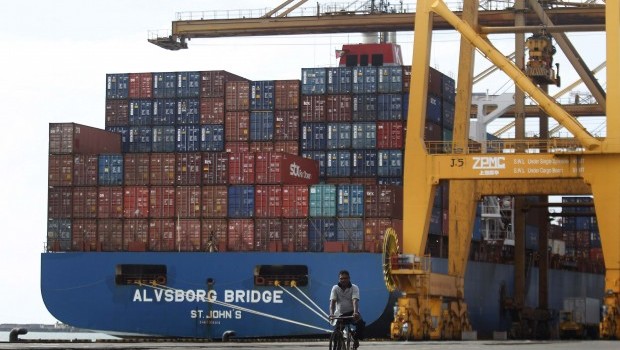
A dock worker rides his bicycle past shipping containers at the main Sri Lankan port in Colombo on June 19, 2013 (REUTERS/Dinuka Liyanawatte)
According to the Tabnak news website, the last foreign shipping lines will cease operations at the port of Shahid Rejaei this week, thanks to the failure of Iran’s Ports and Maritime Organization to compensate for the effect of international sanctions.
The port is located close to the Strait of Hormuz in southern Iran, adjacent to the coastal city of Bandar Abbas. It is one of the largest of Iran’s 11 commercial ports, and handles the majority of the country’s container traffic, according to the website of the Iranian Port and Maritime Organization.
As of June 15, only four international shipping lines operated in the port, but reports now say that they are preparing to sever their links.
The main operator of the port, the Tidewater Middle East Maritime Company, was added to the list of Specially Designated Nationals (SDNs) by the US Treasury Department in June 2011, banning US firms and citizens from dealing with it.
In response, many international shipping companies shifted their operations elsewhere.
New American sanctions targeting Iran’s maritime industries come into effect on July 1, prompting the departure of the remaining container shipping lines from Shahid Rejaei out of fear that they will be penalized by the US for doing business with Tidewater.
Tidewater’s operations in Iran are allegedly linked to the Islamic Republic Guards Corporation, which is also subject to US sanctions.
In order to circumvent the ban on Tidewater, the management of Shahid Rajaei decided to switch operational responsibilities from Tidewater to other companies not sanctioned by the US.
However, Tabrak alleges that mismanagement in the Ports and Maritime Organization means that the transfer cannot take place before the July 1 deadline, leaving the port facing serious problems in filling its berths.
US spokesmen say that shipping firms carrying humanitarian goods, including foodstuffs and medical supplies, are exempt from sanctions, but firms say that the sanctions still make it too difficult to operate in Iran.
In April, the Kuwait-based United Arab Shipping Company, one of the world’s largest, said it was suspending all traffic to and from Iran.
The company said: “We now find ourselves in the peculiar situation where even if we are carrying non-sanctioned cargo to non-sanctioned entities, the cargo will eventually have to be handled by a party which the US government considers as providing financial support to a sanctioned party.”
